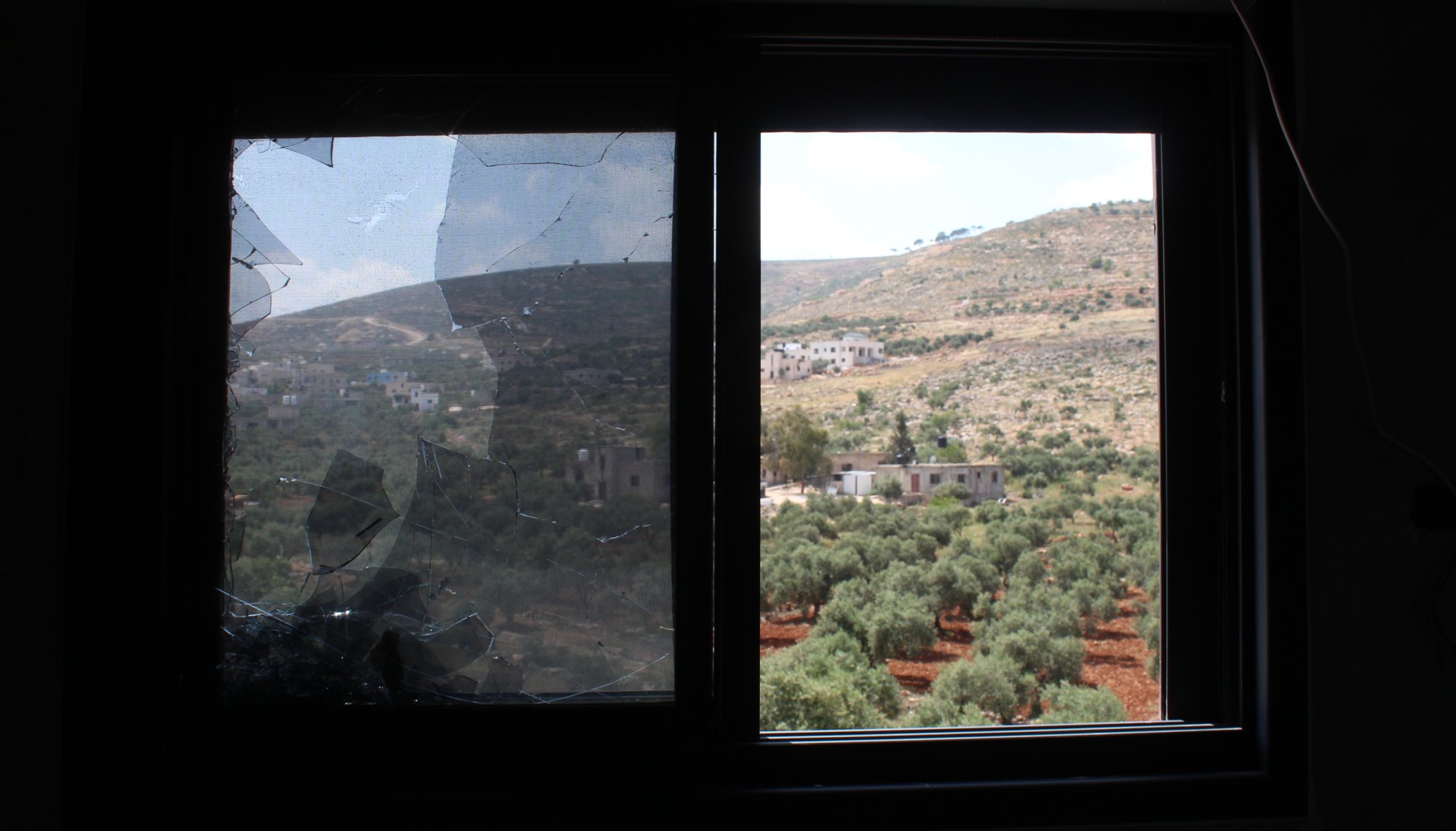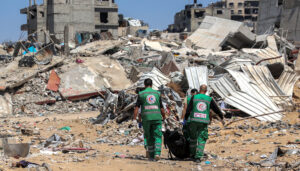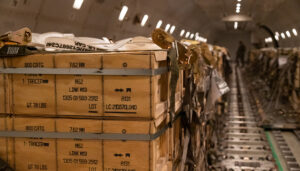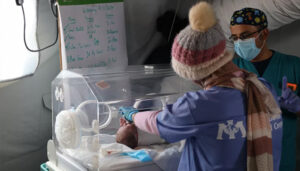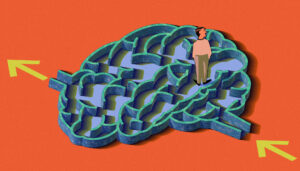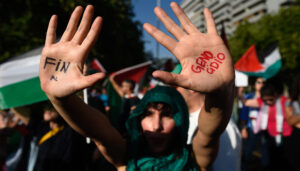Written by Philip Mainwaring
[Editor’s note: Part three of three. Read part one and part two.]
She had not reappeared on this visit. Now that Abu Nimr had a house of many rooms I presumed that she was cloistered away upstairs in some private corner. Abu Nimr organised the pouring and serving of coffee. He wheezed rhythmically as he set about arranging the cups deliberately, with those familiar, decisive movements of his long, elegant fingers. I took out the gift I had brought and placed it before him; the red Swiss army knife that he had asked for. I had had his name engraved on the plastic handle, in Arabic. He took it from me silently with a short nod of his head. In the midst of his newfound riches he turned the knife over and examined it in minute detail with a thin smile playing on his lips, acting out a performance of appreciation for my benefit in which he delicately opened and replaced each tool and contrivance in turn.
‘Good, good,’ he said softly and dropped the knife into a pocket.
After we had drunk our coffee he motioned for us to rise.
‘Come and look upstairs.’
He led me up the incomplete staircase, still without its banister. Smoke drifted into the stairwell from the upper room where the builder was now preoccupied with grilling kebabs over the embers of his fire. The bedroom was on the left, directly above the salon. Against the long wall was a massive bed with a white bedstead, picked out in gold trim and fitted with an inbuilt radio. Absence was the first thing I noticed about the room. Umm Nimr was not there. He pointed out of the window, over the fields of young wheat and across the Ghor. In the late afternoon light the sun glinted off the windows of buildings in Bet Shan, themselves invisible from this distance. Abu Nimr drew me over to the window where he reached down and rummaged among some cardboard boxes. He produced a new pair of binoculars, which he handed up to me, beaming.
‘Beisan,’ he pointed to the west, ‘Look through these.’
Like Abu Bassam and many of the elder village men, he had fled over the Jordan in 1948 when the war had broken out. It had only taken a single afternoon to leave; then there had been forty years to look back and consider each of the ten thousand steps he had taken in flight. Of course a new pair of binoculars had counted among the first of his new purchases. I recalled the risible incident out on the ridge where he claimed to have spotted his old family tent in Bet Shan through the project theodolite.
At work one morning, I had discovered him stooped over the instrument with one eye pressed to the glass and the other tightly closed.
‘I can see Beisan,’ he had cried.
He had not seen his former home at close quarters in four decades. He swivelled the eyepiece a little to the south.
‘There is the town, and there is the ancient tell in the middle of it all. Where is the old cinema?’ he queried. ‘We used to live just near that. That is where our house of hair stood.’
He refocused the eyepiece and then exclaimed, ‘There is our old black tent!’
The other men looked on and shook their heads in bewilderment. They treated Abu Nimr with a measure of impatience because of his abrasive voice, querulous opinions and fund of fanciful stories. He took great interest in the affairs of the world, including everybody else’s business, and he had developed a rich, inner world of fable.
‘What are you talking about, Abu Nimr?’ cried Abu Bassam.
‘Don’t be ridiculous! Do you really think that the Israelis have left your tent intact for the last forty years? Do you think perhaps that they have kept it as a memorial to all the departed Palestinians they miss so much, keeping it upright and in good order until such time as you can go back there and reclaim it?’
But Abu Nimr was away now, peering into his own memory as much as across the Ghor. Ignoring Abu Bassam, he turned to address the group.
‘Before the troubles I used to work for the British Army in their camp near Beisan. I was not then even a man. When the war came they recruited me into their army and I went off to fight the Germans. I was happy to go. The pay was good, more than I had ever seen before.’
‘Nonsense, you old donkey!’ countered Abu Bassam. ‘The British didn’t include Palestinians in their army. For God’s sake, they were here to suppress us, not to have us fight alongside them in their own battles!’ Abu Nimr continued, undaunted.
‘Then one day our unit was captured by an enemy patrol. They took us all prisoner and transported us all the way back to Germany and put us in a prison camp there. We had to stay there until the end of the war.’
‘What did you see from the windows of the prison?’ asked Abu Bassam.
And without a trace of self-consciousness Abu Nimr replied, ‘The usual things – sand, camels, olive trees and donkeys.’
Abu Bassam and the other men shook their heads and departed to begin their work, leaving Abu Nimr to his personal history of the world.
Now, he bade me sit in a chair in front of the window and peer through the binoculars. I sat in silence for a while, fiddling with the focus dials. Then I remembered his absent wife.
‘Umm Nimr; where is she now?’Abu Nimr remained standing with the faint, courteous smile still playing on his lips.
‘There.’ He pointed through the window in the direction of Bet Shan.
‘She has been allowed home to visit Beisan?’
‘No, there.’ He pressed his forefinger down on the binoculars and forced my gaze lower.
I still did not understand and continued staring out of the window over the lone acacia on the horizon.
‘I don’t see.’
‘Under the ground,’ he said simply.
It struck me then that he was pointing to the little cemetery that overlooked the Jordan Valley. I pulled away from the window and looked around at him.
‘She is dead?’
‘Yes.’
It had happened in my absence. I felt an onrush of helplessness, the feeling that something must yet be done to help kind Umm Nimr, sitting cross-legged next to the hearth with her sad eyes, that the surging of time must be allayed until I could find a place to regain my bearings.
‘I am sorry.’
Abu Nimr brought his palms up and pursed his lips.
‘She is gone to God.’
At least he would never suffer my agnostic pangs of loss at the passing of the living into the realm of the dead. I stared at him without speaking for a moment.
‘Her lungs were bad,’ he added after a pause.
‘She was sick for a long time.’ Then, not to be sidetracked, Abu Nimr redirected my attention to the binoculars which so fascinated him.
‘Look through them,’ he urged. ‘Use the knobs to make a clear picture.’
They were powerful glasses. The white cliffs along the Jordan River became visible as well as roads and buildings in Bet Shan.
‘Now that I have a little money,’ he said, ‘I can view my home every day.’
‘Your tent,’ I remarked, scanning the scene through the powerful lenses. Different layers of images resolved and receded as I adjusted the dials. ‘Have you seen it again through these binoculars?’
‘Yes,’ he rasped with conviction, as if I had misunderstood their function.
‘You can see anything through these glasses. You just have to know how to use them properly.’




